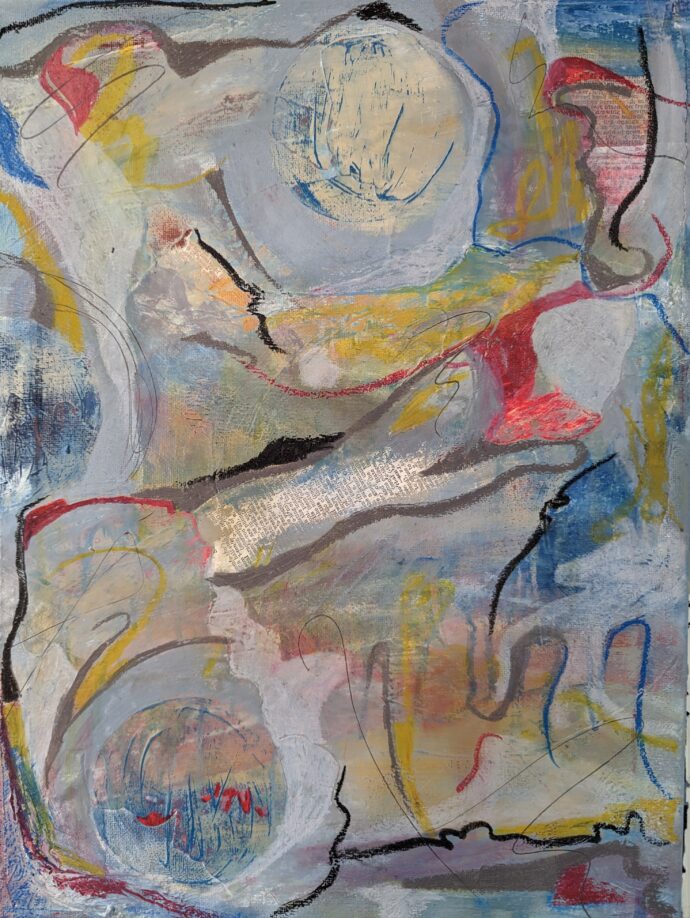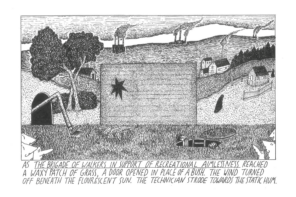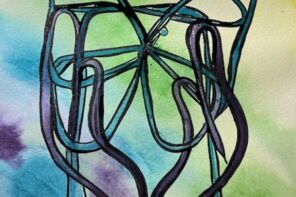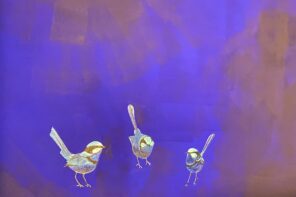I work with a lot of drunks and one of them is always talking about Sally Jo. “This really amazing writer,” Kayla said, describing her to me for the fourth or fifth time over the bar. “She’s written for all the big magazines and some of her articles have been turned into movies and she’s always going to celebrities’ houses and writing profiles of them.”
“I know who Sally Jo is,” I said, holding onto my empty glass because all I wanted was some more ice. Not for a customer, but for me. I liked having ice in my water. It made the water feel alive. Because every time you went back to it, it would have changed a tiny bit.
“She’s amazing,” Kayla went on. “She’s so smart. She got referenced on that new Netflix show and she tweeted about it the next day and it was so funny.”
Kayla took out her phone and scrolled for the tweet.
“Do you think I could,” I nudged my glass and Kayla grabbed it with her small but strong hand. She wore no rings or large pieces of jewelry. A simple girl in a tank top and jeans, she was an only child from a rural town and she’d made it all the way to the city to live a bigger life and maybe, maybe, become a writer herself.
“More ice?” she said.
“Please.”
She scooped ice into my glass and held out her phone to give me a flashing glance at Sally Jo, her mentor, wearing a black T-shirt with a joke about herself printed on the front. It was unclear if she’d made the shirt or someone had made it for her, but what was clear was that Sally Jo was famous enough to be joked about on a global streaming platform and she wasn’t too pretentious to make a joke about it, and some of that humble, silly goodness trickled down onto Kayla, who knew Sally Jo personally and called her “my mentor Sally Jo.”
“It’s great they talked about a writer on TV,” I said. “Maybe it’ll make people want to read more.”
“She’s met so many famous people,” Kayla said, wiping down the bar, which had nothing on it but a small water stain from my glass. “They don’t faze her though. She’s chill about it. She’s been to Taylor Swift’s house.”
“I think you told me that.”
“The article’s really good. She just, like, went over there. Rang the doorbell. Hung out with Taylor.”
“Very cool.”
“I’m lucky she’s my mentor.”
“You are.”
We went back to work, with me serving in the front and her running around behind the bar and simultaneously volunteering to do more work than anyone else: food running, taking carryout orders, clearing tables. Meanwhile she drank. Usually wine or cava to start and then mixed drinks with soju or tequila, and then at the very end of the night she stuffed a bottle of wine and a can of rosé cider into her backpack. She did this out in the open because it was allowed; she worked hard and the boss was never around, and after a while I started doing it too. I took home half-empty bottles of wine to drink before dates in my room, and every time it was a thrill. It felt like something we’d both earned, this free drink consumed in the luxury of our private homes, and in many ways, I felt close to Kayla. I was, and I’m ashamed to admit this, trying to be a writer, too, but I was different from Kayla in that I was embarrassed to be a writer, or to want to be a writer, because it seemed like a pathetic thing to want to be.
“Night, sweetie,” Kayla said to me in front of the darkened restaurant, before putting on her headphones and bouncing home in front of me listening, I knew, to Taylor Swift on her happy-drunk walk to the bus. “See you tomorrow?”
“Yep.”
Her butt shook as she fast-walked down the sidewalk, ten and then 20 and then 50 feet in front of me. We were going the same way but she walked so much faster than me. And I watched her go, like a child in the body of a 33-year-old bartender who was full of hopes and dreams and the will-to-work but who also might turn into nothing at all.
I went over to my friend Sonia’s apartment to sit with her in her cluttered living room and talk, which we hadn’t done in a while because she’d been sick. “Was it lonely?” I asked her, trying to empathize. “Because in my experience, that’s the worst part of being sick. It’s the sadness that settles over you when you’re stuck in bed thinking.”
“It was actually fine,” Sonia said, in a chipper voice, and then laughed at herself. She was wearing jean shorts she’d cut herself that showed off her strong biker legs and a much-washed T-shirt that was short in the waist and the sleeves, meaning she’d probably been wearing it for years. She was in her home, a home she lived in by herself, and she was only torn, if anything, about a relationship she’d been in for over a year. The other girl wanted to be in a closed relationship, at least for a time, and she wanted Sonia to want that too. But Sonia was a free spirit and a sexual person and she wanted to make sure there was a possibility for openness at some point before agreeing to be closed, and this girl responded with a sneer. “It’s good to know you’re planning your escape routes,” the girl named Zoe had said sarcastically to Sonia, and the words had clearly echoed in Sonia’s mind, which was why she was telling them to me now.
“I just don’t know what I want,” she said. “I guess, when I really think about it, I’m afraid.” Sonia sat back in her antique rocking chair. Her feet were up and I could see her toes and the soles of her feet, gray with dust and cat hair. “I’m afraid of failure.”
“We all fail,” I said. “That’s all there really is.”
“I know, but with love, I’m just confused. I feel like when I tell Zoe ‘I love you’ it means a lot and I’m into that, but I also think one day I’m not gonna want to say it anymore and that makes me scared.”
Sonia, who worked in a bookstore and read a lot of books and thought deeply about everything she said and did, looked into my eyes, needing sympathy, and I wanted to sympathize, to be kind and slow with her, but I couldn’t. I exploded.
“Love ends!” I shouted. “It’s okay! It’s normal! It’s what love does! You say it when you have it and one day it goes away and you stop. And that’s fine.”
Sonia looked at the wall over my shoulder. She seemed to be considering it, as she considered all things.
“I think you should close your relationship,” I said. “Try it out. See what happens. It’s not a contract. What you have is special. Just let it be special.”
“I know, but.”
I drank the rest of my funky tasting water, put the jar in the sink and went over to the door to put on my shoes.
“Thank you for coming over,” Sonia said.
“Thank you for having me.”
The next morning, when I was on my computer with nothing to do and certainly no inspiration to write, I watched a video sent by my dad, a retired man with a gray goatee, which he’d saved as “Duck Family,” and I knew in advance what it was going to be.
It was footage he’d shot of a mother duck escorting her baby chicks to the lake, which was near our house, but across a busy road. When I first heard about the mother duck, nursing her eggs up against the side of the house, I was concerned about the road. How would they survive? “I dunno” was all Dad said when I asked him what could be done to help the ducks, but now the ducks were ready for the water and somehow my father had filmed them, crossing the road and going into some bushes, close to where the water would be. The footage was shaky and not particularly exciting but when I closed my computer screen, I felt something like hope being restored to me, and then, like a form of cosmic compensation for my failure as a writer, a girl I’d met a few weeks earlier agreed to go out with me. I didn’t think she’d say yes. She was a friend of a friend who had only ever dated guys, but she looked so happy crossing the street to meet me, waiting for her outside of a bar, that I knew people could change and maybe she was special. Or maybe she saw something in me that was special. Either way, before she said anything, she got on her toes and put her arms around me and kissed me on the cheek, as if we’d been dating for many years and this was just another night for us, another happy night on the town. This disarmed me and led naturally to us staying up late at her place, a studio apartment in a safe and settled part of town. It felt right to be there and she reacted loudly and passionately to me kissing her neck and feeling her hair and smelling her arms and doing all manner of things that keep people up late at night, and when I left her place the next morning, I had no worries except for one. I thought my bike might’ve been stolen. It was a nice bike and I’d never left it out overnight before. And yet I was so happy, leaving this girl’s apartment, that I also didn’t care if it was stolen. If losing my bike meant that I’d been able to sleep with this girl, then let it be lost. But it wasn’t lost. I opened her door and there it was. My bike was there. Life was good.
In the days that followed, I kept getting texts from this girl about how much she wanted to be having sex at two in the afternoon. It took me off guard. Women were so often shy or afraid to reveal their true selves but this one seemed different. This one wanted to tell me that she missed me and she wanted me and she wanted me to like her too. I rode over to her apartment one night after work just to kiss her and tuck her into bed. Another night I went over there and she played music and held me on her little couch and it felt like we were teenagers again, all touchy-feely and hanging out in her messy room. Then one day, right when I was leaving her place to go to work, she started wanting to have sex so badly that she started touching herself, right in front of me, so I couldn’t leave. Sex was the best way to forget about failure. Writing, money, success—none of it mattered when the only real thing about life was passion. Fully lived, luxurious passion, enacted slowly, until time became untrue.
“How’s the book going?” I asked Kayla, in a good mood at work.
“It’s not,” she said. “I work all the time, and when I’m not here, I have to do laundry or get groceries and all I want to do is sit on my couch and turn on a rom-com and drink. But at least I’ve got an outline. I just have to finish it. And Sally Jo is so nice. She said she’d connect me with an agent and help with all that as soon as it’s ready.”
“Does she give you writing advice?”
“Sally Jo?”
Kayla fixed the strap of her tank top. She had a soft, matronly body and she wore exclusively basic clothes. Plain blue jeans, practical leather belts, solid-colored tank tops, a waterproof rubber watch.
“Not really,” she said. “She talks about business, like the agent stuff, and her own work because it’s always getting adapted and turned into things and she’s working on ten things at the same time.”
“How did you meet her again?”
“She used to go to this one bar where I worked in Manhattan. I met her there. We talked all the time.”
“She was alone?”
“Yeah.”
Sally Jo began to turn into someone else in my mind, someone who drank with young writers and talked to them about writing but who was, in some way, totally tragic. Sure, she had gone to an Ivy League school and won 500 prizes and had three beautiful kids with her beautiful husband, but why was she drinking with a cross-eyed bartender like Kayla? She must have been desperate for friends, for attention, for some way to stop time.
I went to the girl’s apartment that night and she seemed happy to see me but then she said I couldn’t stay. She had something early the next morning. I waited for more information that didn’t come.
“I’ll text you later,” she said, smiling a little as she closed the door.
I called my dad the next day to talk about the ducks that had brought me so much luck.
“It was so moving,” I said. “The way they followed the mom on their wobbly legs.”
“Pretty cool, isn’t it?”
I was pacing up and down my block, not crossing so as to remain in the shade.
“I was just wondering,” I said. “How did you get the ducks across the road?”
There was a pause.
“I didn’t.”
“What?”
“I took that video on our street, right outside the front door. They went into the neighbor’s bushes. I have no idea if they crossed the street.”
“Jesus Christ, Dad. Couldn’t you have escorted them or stopped traffic or, I don’t know.”
“It’s not up to me.”
“Yeah, but you could’ve helped.”
We hung up and I cried out for the ducks, the mother and her babies, who were, if not clobbered by car tires, then certainly scared to death.
The girl I’d been seeing abruptly stopped writing to me and whenever I asked her if she wanted to hang out, she had a new excuse: too sick, too depressed, too busy, too full. I called my friend, our mutual friend, and asked what was going on.
“I think it’s Lance,” my friend said.
“Lance?”
“Some poly guy she’s been seeing who lives in Chicago. I think he’s in town.”
I hung up, irate, and swore at every Lance ever born. It was the worst name. It was an asshole name. It was a terrible, sweating, hairy-chested man’s name and he probably got her messages too. He probably got her texts at two in the afternoon saying how much she wanted him and his beautiful body because that’s how selfish and terrible we all are, we’re all just big babies who want to be liked.
“Shot o’clock?” It was Kayla, pouring herself a shot of the good tequila that was supposed to be on the high shelf but was kept low because she drank so much of it.
“Maybe later,” I said.
I went outside to check on some tables and ran into Sonia. She was riding by on her old yellow bike and when she saw me stacking dirty plates, she pulled over and we hugged.
“I’m on my way to Zoe’s,” she said, so happy and squinting in her jean shorts and crop top, she seemed to be literally beaming light.
“You love her,” I said, just to provoke her, and Sonia smiled with her lips clamped shut. She couldn’t say it, but it was true. She loved someone. She was going to her. She had found something so nice and good she couldn’t say its name.
“When can I see you?” I said. “I’m free tomorrow and Saturday night and Sunday day.” My schedule was vast and empty. I was falling. Could she see?
“Next week!” she said, in a chipper voice.
I nodded, gladly, and felt devastated. What would I do to fill the days? I had nothing to do, no one to see.
She rode off, pedaling in her happy helmet, and I went back inside and found Kayla pouring herself another shot.
“How about now?” she said. “Baby shot?”
“I’m good,” I said, suddenly determined to be nothing like Kayla, even if that meant being painfully sober five nights a week.
She swallowed down her shot and smiled at me with her tongue sticking out. A childish face I hadn’t seen an adult make in years.
“How’s your book going?” I asked her, feeling mean.
“Good! Nancy Jo said she’d hook me up with an agent. I just need to sit down and actually write the thing.”
She vanished behind the bar, where she toiled and turned and cleaned as the restaurant emptied out and when I asked about her day off, at the very end of the night, as I was putting the chairs on top of the tables, I already knew what she was going to say.
“I need one of those, ‘Get shit done,’ days,” she said. “Do laundry, get groceries, fix a dead bulb, that sort of thing. Then I’m gonna lie on the couch with the AC blasting and a glass of wine and watch a really bad romantic comedy. Speaking of which.” She went over to the wine fridge, grabbed an unopened bottle and shoved it in her bulging backpack, filled with Tupperware snacks and hand lotion and all the other pieces of self-care she carried around like the Girl Scout leader she couldn’t help but be.
I sat at the bar. There was nothing else for me to do.
“If you wanna take out the trash,” Kayla said, “I’ll stay and figure out money.”
“You sure?”
“I’ll be fine. I’m gonna blast my Tay Swift and clean this damn slushie machine.”
I wasn’t supposed to leave without Kayla. I was supposed to be, for that portion of the night, her pseudo-bodyguard, so even if I wasn’t doing anything other than looking at my phone, my presence was supposed to protect her, or persuade roving robbers not to bust in through the door.
“Wait, your tips!”
Kayla looped around the bar and held out two crumpled one-dollar bills. I thanked her for my share of the tip pool—the part that came in cash—and then she asked me, for the millionth time, how it felt to be so rich.
Erica Peplin is a fiction writer and film critic from Detroit, Michigan. Her stories have appeared in n+1, McSweeney’s, American Chordata, and Joyland Magazine. Her debut novel will be published by Gallery Books in 2025. She lives in Brooklyn.




